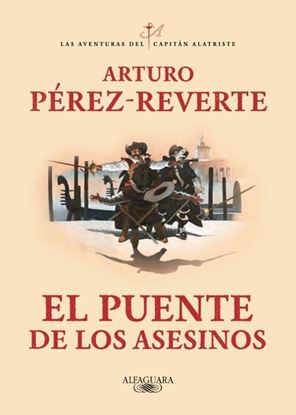

LIMPIEZA EN LA SANGRE (ALATRISTE 2)
A punto de incorporarse a su antiguo tercio en Flandes, Diego Alatriste se ve envuelto por mediación de su amigo don Francisco de Quevedo en otra peligrosa aventura. Una mujer ha aparecido estrangulada en una silla de manos frente a la iglesia de San Ginés, con una bolsa de dinero y una nota manuscrita: «Para misas por su alma». El enigma se complica con los sucesos misteriosos que ocurren tras las paredes de un convento, cuando Alatriste es contratado para rescatar de allí a una joven novicia.
En el azaroso y fascinante Madrid de Felipe IV, entre lances, tabernas, garitos, intrigas y estocadas, la aventura pondrá en juego la vida de los amigos del capitán, haciendo surgir del pasado los fantasmas de viejos enemigos: el pérfido secretario real Luis de Alquézar, el inquisidor fray Emilio Bocanegra y el siniestro espadachín italiano Gualterio Malatesta.
1,450
1,160
EL SOL DE BREDA (ALATRISTE 3)
se escenifican las batallas y el asedio de la ciudad de Breda en 1625 por los tercios españoles en Flandes.
Flandes, 1625. Alistado como mochilero del capitán Alatriste en los tercios viejos que asedian Breda, Íñigo Balboa es testigo excepcional de la rendición de la ciudad, cuyos pormenores narrará diez años más tarde para un cuadro famoso de su amigo Diego Velázquez. Siguiendo a su amo por el paisaje pintado al fondo de ese cuadro, al otro lado del bosque de lanzas, veremos a Íñigo empuñar por primera vez la espada y el arcabuz, peleando por su vida y la de sus amigos. Estocadas, asaltos, batallas, desafíos, encamisadas, saqueos y motines de la infantería española, jalonarán su camino a través de un mundo devastado por el invierno y por la guerra.
«Al lento batir de los tambores, las primeras filas de españoles movíanse hacia adelante, y Diego Alatriste avanzaba con ellas, codo a codo con sus camaradas, ordenados y soberbios como si desfilaran ante el propio rey. Los mismos hombres amotinados días antes por sus pagas iban ahora dientes prietos, mostachos enhiestos y cerradas barbas, andrajos cubiertos por cuero engrasado y armas relucientes, fijos los ojos en el enemigo, impávidos y terribles, dejando tras de sí la humareda de sus cuerdas de arcabuz encendidas...
1,450
1,160
EL ORO DEL REY (ALATRISTE 4)
Las aventuras del capitán Alatriste», que acontece en Sevilla en 1626, el capitán recibe tras su regreso de Flandes el encargo de reclutar a un pintoresco grupo de bravos espadachines para una peligrosa misión.
Sevilla, 1626. A su regreso de Flandes, donde han participado en el asedio y rendición de Breda, el capitán Alatriste y el joven mochilero Íñigo Balboa reciben el encargo de reclutar a un pintoresco grupo de bravos espadachines para una peligrosa misión, relacionada con el contrabando del oro que los galeones españoles traen de las Indias. Los bajos fondos de la turbulenta ciudad andaluza, el corral de los Naranjos, la cárcel real, las tabernas de Triana, los arenales del Guadalquivir, son los escenarios de esta nueva aventura, donde los protagonistas reencontrarán traiciones, lances y estocadas, en compañía de viejos amigos y de viejos enemigos.
1,450
1,160
EL CABALLERO DEL JUMBO AMARILLO (AL. 5)
El caballero del Jubón amarillo se desarrolla en el mundo de los corrales de comedias del Madrid del siglo XVII. En esta ocasión Diego Alatriste volverá a cruzarse con viejos amigos y viejos enemigos, y con los personajes famosos de la época como Lope de Vega, Calderón de la Barca y el capitán Alonso Contreras.
Lances, estocadas, intrigas palaciegas y aventuras amorosas salpican un relato de acción trepidante.
«Don Francisco de Quevedo me dirigió una mirada que interpreté como era debido, pues fui detrás del capitán Alatriste. Avísame si hay problemas, habían dicho sus ojos tras los lentes quevedescos. Dos aceros hacen más papel que uno. Y así, consciente de mi responsabilidad, acomodé la daga de misericordia que llevaba atravesada al cinto y fui en pos de mi amo, discreto como un ratón, confiando en que esta vez pudiéramos terminar la comedia sin estocadas y en paz, pues habría sido bellaca afrenta estropearle el estreno a Tirso de Molina. Yo estaba lejos de imaginar hasta qué punto la bellísima actriz María de Castro iba a complicar mi vida y la del capitán, poniéndonos a ambos en gravísimo peligro; por no hablar de la corona del rey Felipe IV, que esos días anduvo literalmente al filo de una espada.
1,450
1,160
CORSARIOS DE LEVANTE (ALATRISTE 6)
Durante casi dos años serví con el capitán Alatriste en las galeras de Nápoles. Por eso hablaré ahora de escaramuzas, corsarios, abordajes, matanzas y saqueos. Así conocerán vuestras mercedes el modo en que el nombre de mi patria era respetado, temido y odiado también en los mares de Levante. Contaré que el diablo no tiene color, ni nación, ni bandera; y cómo, para crear el infierno en el mar o en la tierra, no eran menester más que un español y el filo de una espada. En eso, como en casi todo, mejor nos habría ido haciendo lo que otros, más atentos a la prosperidad que a la reputación, abriéndonos al mundo que habíamos descubierto y ensanchado, en vez de enrocarnos en las sotanas de los confesores reales, los privilegios de sangre, la poca afición al trabajo, la cruz y la espada, mientras se nos pudrían la inteligencia, la patria y el alma. Pero nadie nos permitió elegir. Al menos, para pasmo de la Historia, supimos cobrárselo caro al mundo, acuchillándolo hasta que no quedamos uno en pie. Dirán vuestras mercedes que ése es magro consuelo, y tienen razón. Pero nos limitábamos a hacer nuestro oficio sin entender de gobiernos, filosofías ni teologías. Pardiez. Éramos soldados.
1,450
1,160
EL PUENTE DE LOS ASESINOS (ALATRISTE 7)
Acompañado del joven Íñigo Balboa, a Alatriste le ordenan intervenir en una conjura crucial para la corona española: un golpe de mano en Venecia para asesinar al dogo durante la misa de Navidad del año 1627, e imponer por la fuerza un gobierno favorable a la corte del rey católico en ese estado de Italia. Para Alatriste y sus camaradas -el veterano Sebastián Copons y el peligroso moro Gurriato, entre otros-, la misión se presenta difícil, arriesgada y llena de sorpresas. Suicida, tal vez; pero no imposible.
Diego Alatriste bajó del carruaje y miró en torno, desconfiado. Tenía por sana costumbre, antes de entrar en un sitio incierto, establecer por dónde iba a irse, o intentarlo, si las cosas terminaban complicándose. El billete que le ordenada acompañar al hombre de negro estaba firmado por el sargento mayor del tercio de Nápoles, y no admitía discusión alguna; pero nada más se aclaraba en él.
1,450
1,160














